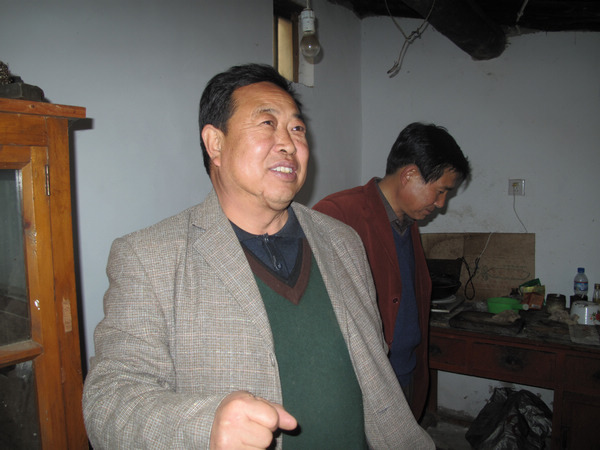Quake station worker 'happily single'
Updated: 2011-12-07 07:41
By Wang Qian (China Daily)
|
|||||||||
|
 |
|
Cao Bengang, 56, says he likes to call himself "a happy bachelor". As a worker in a seismic station in Tianjiapo village, Gansu province, he has had very little time to be with his family. Wang Qian / China Daily |
DINGXI, Gansu - Although married, 56-year-old Cao Bengang, a worker in the remote Tongwei seismic station in Tianjiapo village, Gansu province, likes to call himself "a happy bachelor". Since the past 30 years, he has spent very little time at home.
"In seismic stations, data monitoring is done round-the-clock. It's a 24-hour job, and going home is a luxury," Cao says.
He can, at the most, take a month off a year, Cao says with a sigh.
While the families of his two colleagues have visited the station, Cao's have not, which made him "a real bachelor".
"I just don't let them, because the water here is bad," Cao says, adding that the local water is too astringent to drink or irrigate the farmland.
Qi Yinglu, 52, director of the station, agrees. Each time he's back from a visit home, he suffers from diarrhea for at least three days.
"The water here can only be used to wash clothes and clean the floor," Qi says. Clothes, when washed, wore a bleached look because of the high alkaline content.
Things turned worse in December 2010 when a severe drought hit most parts of China, drying up the only water supply to the region and it hasn't been restored since.
A well was dug this year, but the water was worse than the earlier variety, Qi said.
They have to buy water from a dealer at 80 yuan ($12) per cubic meter, to be used only for drinking and cooking purposes.The station is located in Tianjiapo village, about 10 kilometers away from the nearest town. The three workers in the station cover all the facilities like telegraph poles and water testing spots within nine sq km area.
It means Cao and his two colleagues have to ensure that the more than 60 telegraph poles in the area are working, collect geomagnetic information and water samples every morning at 8 am. The last job entails a 4-hour bicycle ride.
Every morning, Cao has to get up before 6 am and ride for at least two hours to get water samples from a spring at exactly 8 am.
"In cases of extreme weather, like torrential rain or a snowstorm, the two-hour ride is much longer," Cao says. On a lucky day man rides the bike, on other days the bike rides the man, he jokes.
His station is located at 1,890 meters above sea level. Although altitude sickness is always not that obvious, the temperature can reach -30 C in winter.
"After a snow fall, patches of snow remain until summer comes," he added.
Once after a-half-day ride, his bike collapsed and the happy bachelor found himself standing in knee-deep snow. He hadn't eaten anything that morning.One day in July the geomagnetic data looked abnormal at about 6 pm. To find out what the problem was, the team launched a search that lasted more than 6 hours, as it entailed examining more than half of the poles. The line was broken by a local farmer's sheep.
This was just one of the thousands of crises Cao had faced during his three-decade-long career.
"Several university graduates came to work here, but no one lasted more than a year," Qi said, adding that the only source of entertainment at the station was a television set with about 30 channels.
In another four years, Cao and the 56-year-old Zhang Shiming will retire. Qi wondered if there would be takers for their jobs.
Cao is looking forward to his retirement, and the chance to spend more time with his wife and 30-year-old son, working in Lanzhou, Gansu province.
"I just want to make up for the days when I was absent from the family," he said.
In Gansu there are about 180 seismic station workers posted in remote areas to monitor geological data round the clock, according to the statistics from the Earthquake Administration of Gansu province.
"Their work environment is improving gradually," Yang Liming, vice-director of the Gansu earthquake administration, said, adding every year the central government would invest about 800,000 yuan to improve the province's earthquake stations.











